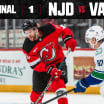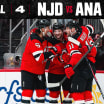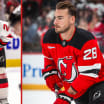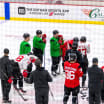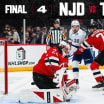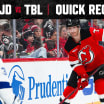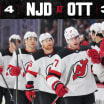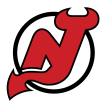What is the true meaning of winning the Stanley Cup?
Does a player learn "Life Lessons" from hoisting Stanley?
How important are coaches in terms of winning a title?
These are among the questions raised by author Ross Bernstein in his penetrating book, "Raising Stanley -- What It Takes To Claim Hockey's Ultimate Prize."
Having won three Stanley Cups, several Devils players were interviewed by scribe Bernstein. Their reactions form a foundation for this insightful work.
For example, Devils defenseman Shawn Chambers scored two goals -- including a third period "clincher -- in the fourth and Cup-winning 1995 Final game. He told Bernstein what it was like when it was obvious that his goal guaranteed the Cup.
"What a feeling," said Chambers. "The emotion was just incredible. When I came to the bench, there was Mikey Peluso, our tough guy, just bawling uncontrollably. That's what the Cup is all about; just leaving it all out there, and when it's over, you're spent. That was Mikey, he was just spent. Wow, what a moment!"
John MacLean was not only the hero of New Jersey's first (1995) playoff team but a star in the first Cup triumph as well.
"You just have to feel it and experience it to appreciate just what it means," MacLean asserted. "So much sacrifice goes into it, not only by me but by my family. When I finally did win it the feeling was almost indescribable."
Getting a Lift Out of Stanley | 40 YEARS WITH STAN
Stan Fischler digs into what it has meant to Devils alumni to have hoisted the Stanley Cup
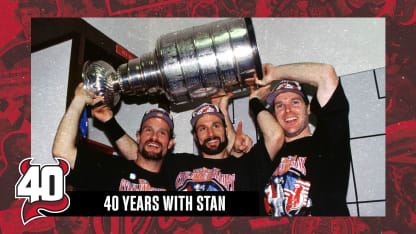
Another section of "Raising Stanley" zeroed in on "Life's Lessons" learned from winning. Neal Broten, another hero of the 1995 team, summed it up well.
"When I was a little kid," Broten began, "my peewee coach told us that to be successful you have to play as a team. When our Devils team won The Cup in '95 everyone contributed; regardless of his role or stature on the team. Everyone worked hard and played together as a team. That was it."
Tom Chorske, Broten's teammate, added a fillip. "Not only did we trust one another, we all genuinely liked one another. Without a doubt, that was a big factor in us winning The Cup."
A segment in the "Winning As A Team" chapter featured a near fistfight between hot-tempered forward Claude Lemieux and defenseman Scott Stevens. Ironically, the team enforcer, Mike Pelus was the one who broke up the near melee. Teammate Jim Dowd was a witness.
Dowd: "Scott and Claude started going at it like two bulls; they wanted to kill each other for whatever reason. Luckily Mike broke it up and got them separated. Sometimes those things happen off the ice, but on the ice, they were teammates and all business. They put their differences aside and did what they could to help the team win."
Virtually every Cup-winning team suffers injuries and the manner in which players handle them often is the difference between winning and losing. Hence, the importance of the chapter, "Playing Hurt." Among the New Jersey skaters interviewed, Dowd never forgot the damage inflicted on his fuselage.
"I had shoulder surgery that year and it was tough. But I rehabbed it and eventually worked my way back into the lineup. If I didn't work myself back into playing shape, I knew that I might have found myself out of a job."
Author Bernstein was at his reportorial best when it came to giving Devils players a "Third Degree" over what Ross called "Defining Moments" leading to Cup wins. Among the quotes I liked best, Tom Chorske's tops my list:
Chorske: "One of the most defining moments for me came on the team flight back to New Jersey from Detroit. We were up two games to none at that point to the heavily-favored Red Wings. I was sitting next to Marty Brodeur on the plane and just talking.
"I said, 'Man, I can't believe we're up 2-0 in the Stanley Cup Final. Can you?'
He just looked at me and said very matter-of-factly, 'It's over. Trust me; this thing is over. The way you guys are playing and the way I'm seeing the puck, it's over.' He was so confident and had such conviction, it was incredible. Well, sure enough, we swept them a couple of nights later."
Needless to say, any volume that X-rayed a championship team inevitably would zero in on coaching. I recall Bobby Holik telling me that Jacques Lemaire was the best coach he ever had. Several others agree.
"He was very different from any other coach I've ever had," added Neal Broten.
"Jacques had much more than a hockey mind. or intelligence than a lot of the other coaches. The guy won almost two handfuls of Stanley Cup rings, so how can you argue with that."
Ken Daneyko: "Jacques taught us just what it was going to take to become champions. He got us all pulling the rope in the same direction. He reminded us that we can say it in our heads all day, but until we feel it in our hearts it will never happen. I learned more in the first two months that Jacques was with us than I had in the previous ten-eleven years."
Bernstein's book -- rather appropriately -- concludes with a personal touch. One of the last chapters is called "Hands On The Prize," which is as self-explanatory as it can get. For that, the author checked in with Shawn Chambers and his 1995 Cup-holding recollections:
"Scott Stevens got it first because he was the captain," said Chambers. "From there, it went to the two assistants, Ken Daneyko and Bruce Driver. One thing is for sure; you don't ever talk about it or discuss it beforehand. That will jinx it for sure. And, for that matter, you never talk about winning the Cup either, you just win it. Period!"
After winning it, each Devil had the opportunity to bring the Silverware home for at least a day. Some of the episodes were down-home to say the least.
Neal Broten: "My wife trains horses, so we thought it would be pretty neat to feed one of her favorite horses some oats out of the Cup at our ranch in River Falls, Wisconsin. We just made sure to do it after we had drunk out of Stanley."
Mister Devil, Ken Daneyko, slept with the trophy the first night. "In the morning, I had my kids eat cereal out of it. From there I took it everywhere I could throughout the State of New Jersey."
Jim Dowd had breakfast with the Cup and then took it to Monmouth Race Track.
Scott Niedermayer brought it to British Columbia and hauled it to the top of a mountain for an outstanding photo op.
As always, Stanley's travels were accompanied by the official Hall of Fame Keeper of the Cup. He had a scare after the Devils' third title in 2003. Jamie Langenbrunner took Stanley to a lake and went tubing with him behind his boat.
"The Cup Keeper was a bit nervous about it," Jamie concluded, "So I put a life jacket around Stanley!"

